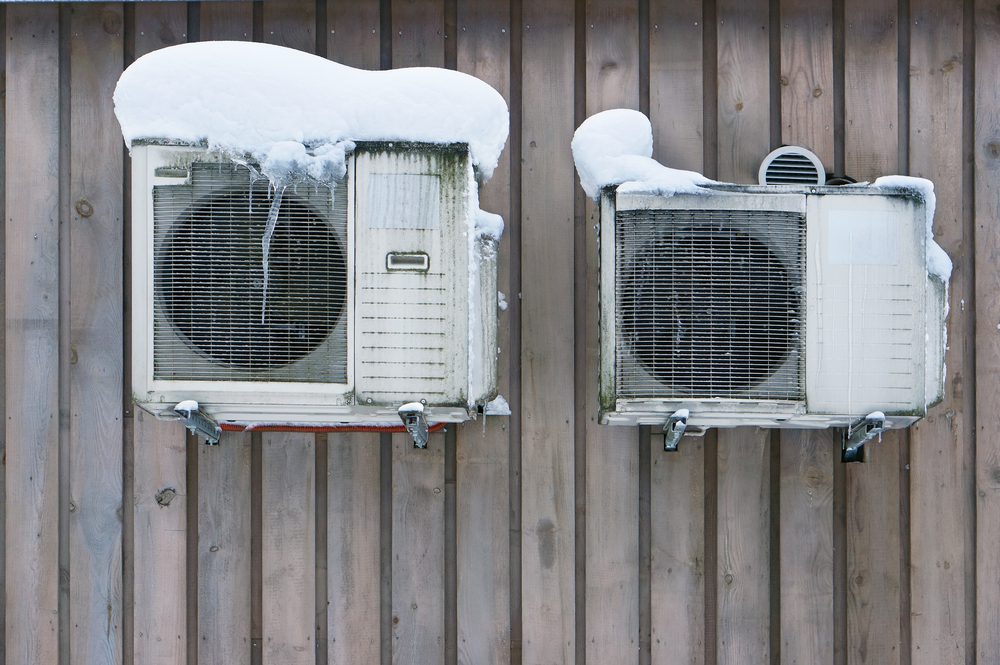
Wintertime is coming. Soon you will find the outdoor coils of your heat pump covered in thin ice. This is actually normal. The unit will usually go on a defrosting cycle to melt the ice. However, there are times when the entire heat pump is covered in ice including the coil interiors and the top of the unit. Once this happens, you have a serious issue at hand. The problem needs to be addressed immediately in order to prevent further damage to the equipment.
HOW TO DEFROSTING CYCLE WORKS
Once the heat pump needs to defrost, the reversing valve is activated and air conditioning mode is switched one. Once it goes in this mode, the external fan shuts off and the outdoor evaporator becomes the condenser. This is to increase the temperature of the high-pressure refrigerant in the outdoor coil in order to melt the ice.
The offset the cold air blowing through the vents, the back-up heat or second stage heat is activated. After a few minutes when a certain temperature is reached, it automatically switches back to heating mode.
Different heat pump models and brands have their own methods of going into defrost. For instance, in older models they usually have a defrost thermostat with mechanical timers. Once the thermostat becomes cold, it automatically switches to defrost mode regardless whether there is ice or none. Once the thermostat becomes warm enough, it immediately switches to heat mode again.
Newer models have more sophisticated methods of defrosting. Most new models contain temperature sensors and solid-state control modules. Perhaps the most sophisticated is the Demand Defrost system, which takes into account the outside air. This is more energy efficient since it only goes into defrost mode if necessary.
WHEN TO FIX THE HEAT PUMP ON YOUR OWN
There are many reasons why a heat pump will iced up in winter. However, some issues can be fixed without the need to call a heating professional. Some of the issues that homeowners can fix themselves include a blocked outdoor coil. Check to see if there are snowdrift or probably leaves that were stuck in the coil. Just clean it and you are good to go. A leaking gutter can also cause the heat pump to ice up. To remedy this, simply cover the top of the unit in order to prevent the water from getting into it. Freezing rain can also cause to the top of the unit to ice up, so it is better to put a cover on top of the unit to prevent it from freezing. A unit sunk in the ground can also iced up since snow is slower to melt and there is nowhere for the water to drain off. This can be remedied by removing snow and standing water all around the unit. If the concrete slab below the unit deteriorated, then it is probably time to call on a professional that can help elevate unit from the ground.
WHEN TO CALL FOR HEATING MAINTENANCE SERVICE
It is time to call a heating professional from First Class HVAC once you observe bad defrost control or timer, bad defrost relay and bad defrost sensor or thermostat. A knowledgeable HVAC specialist should fix a bad reversing valve solenoid coil or a sticking reversing valve. Other issues that need the help of an HVAC company include low refrigerant charge, bad outdoor fan motor and any restriction issues.
If you need the services of an HVAC specialist contact First Class HVAC at (302) 804 1309 for Sussex, (302) 213 8396 for Kent, (302) 307 4530 for New Castle and (410) 713 4099 for Maryland. We offer services such as Bethany Beach heating repair services, Dover heating repair services, Fenwick Island heating repair services, Lewes heating repair services, Middletown heating repair services, Milford heating repair services, Milton heating repair services, Rehoboth Beach heating repair services, Bethany Beach heating system repair, Dover heating system repair, Fenwick Island heating system repair, Lewes heating system repair, Middletown heating system repair, Milford heating system repair, Milton heating system repair and Rehoboth Beach heating system repair.

